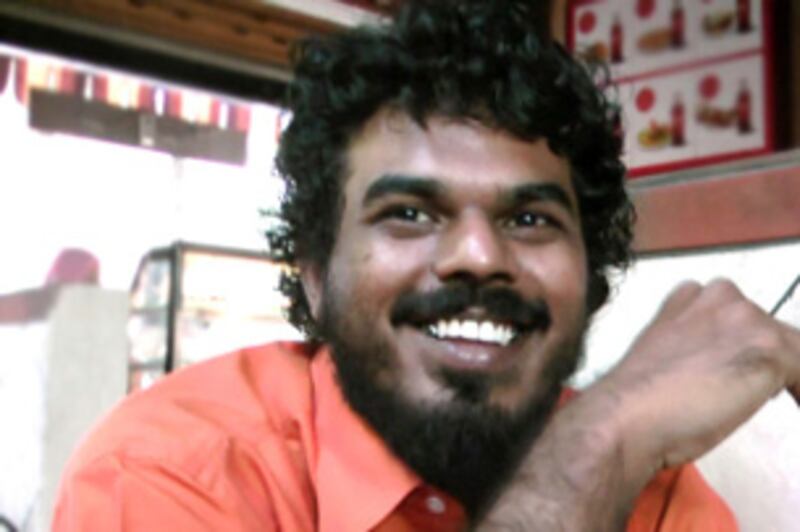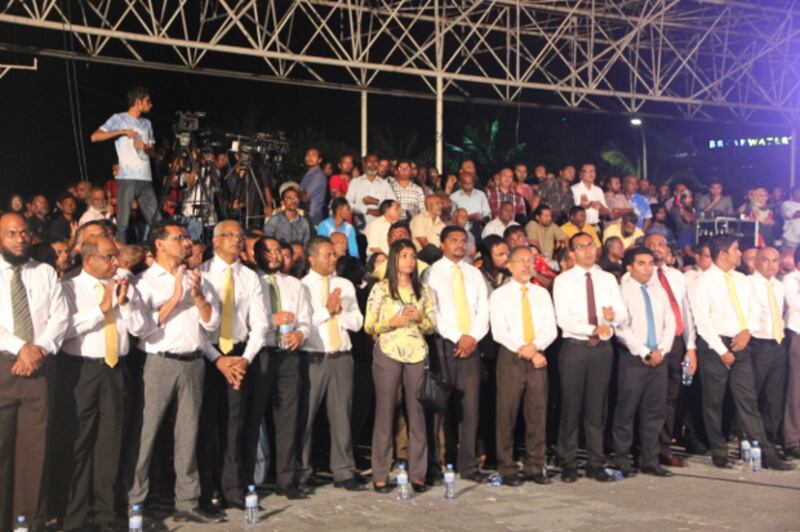Updated at 8:20 a.m. ET on 2016-08-09
Two years have passed since Maldivian journalist Ahmed Rilwan vanished, but the grief and angst are still palpable in his family home in Male.
The dining room of the compact fourth-floor apartment is cluttered with piles of papers relating to the reporter’s mysterious disappearance.
“We believe he was abducted on government orders,” Mariyam Fazna, Rilwan’s sister, told BenarNews during a recent visit.
Rilwan, 30, a reporter for Minivan News (now known as Maldives Independent), was last seen the night of Aug. 8, 2014, getting off a ferry on the nearby island of Hulumale, where he rented an apartment. He never made it home.
Rumors are rife in Maldivian journalistic circles that Rilwan was about to break a story on a corruption scandal involving some top officials of President Abdulla Yameen’s government, which came to power after a controversial election in 2013.
“We don’t know about the story Rilwan was investigating. He never spoke to us about his work. But he did mention a couple of times that he felt as if he was being followed,” Fazna said.

Ahmed Rilwan [Courtesy Maldives Independent]
There has been “no progress or transparency” in the investigation by police, who acknowledged only in April of this year that the journalist had been abducted, she said.
Chief Inspector Abdulla Satheeh had said then that Rilwan was possibly abducted by members of Male’s notorious Kuda Henveiru gang outside his Hulumale apartment, and taken in a red car that belonged to a senior member of the drug-trafficking group.
A DNA analysis of hairs lifted from the trunk of that car matched that of Rilwan’s mother, Satheeh had said.
Even so, on July 20, a court acquitted two suspects in the abduction – Aalif Rauf and Mohamed Nooradeen, both Kuda Henveiru gang members – bringing the investigation back to square one.
Holding back tears, Rilwan’s mother, Aminath Easa (see video), said the only reason her youngest son had not been found was that the government had a hand in his abduction.
“The government has taken him. That’s why he has not been found and nothing has come from the investigation,” Easa told BenarNews, adding, “Even when we take to the streets in protest, police impede us with pepper spray and tear gas.”
Journalists arrested
After Rilwan’s abduction, which garnered international media attention, at least 33 Maldivian journalists have been arrested – but later let off – for raising their voices against government policies, said Ali Naafiz, a journalist with the Mihaaru newspaper, an offshoot of the now-defunct Haveeru.
Haveeru, Channel News Media (CNM) and Addu Live – all known to run reports critical of the current government – were forced to shut down this year due to “political pressure,” Naafiz told BenarNews.
He was among 16 journalists arrested in April while protesting a new draft law that criminalizes defamation.
“We were protesting this law proposal because we are fully aware the judiciary is a pawn in the hands of this government. We could be jailed for any story that the government did not like,” Naafiz said.
“It was a peaceful sit-in protest. But the police moved in and dragged us away. We were held for about 12 hours,” he said.
Besides news portal Maldives Independent, the opposition-aligned Raajje TV is the only television channel that is critical of the government and still allowed to broadcast in the Maldives. But it remains blacked out in hotels and resorts that annually host over a million foreign tourists, who flock to the archipelago for its white beaches and crystal clear waters.
The anti-defamation bill, which is expected to be passed this week and to come into force within three months, includes provisions to impose fines of up to U.S. $130,000 on media outlets.
“This move by the government and the government-controlled parliament is aimed at silencing critics and weakening the Maldives’ already fragile media,” Naafiz said.
Naafiz is one of about 20 Haveeru journalists penalized by a civil court last month with a two-year ban from working for any media outlet in the country.
He and other Haveeru journalists launched Mihaaru in May.
“The ban is still in effect as no decision has yet been made on accepting an appeal filed separately by us and the attorney general. We are defying the ban and risk being subjected to arbitrary action,” he said. “We’re in constant fear. Anything can happen [to us] at any time.”
CNM reporter Misbah Abbas, too, refuses to give up the fight.
“Eleven of us at CNM are trying to re-launch. At the moment, we are working without income. It’s hard because, like any other media outlet, we survive on ads. And advertisers don’t want to go against the government by investing in a blacklisted organization,” Abbas told BenarNews.
‘Trappings of democracy’
Yameen’s rival in the 2013 election, former president Mohamed Nasheed, is now living in the United Kingdom where he has been granted refugee status, according to reports.
Nasheed was elected in 2008 after decades of autocratic rule in the Indian Ocean archipelago, but resigned suddenly in February 2012 and days later announced he had been forced out in a coup.
He was handed a 13-year prison sentence on terrorism charges in a March 2015 conviction that was criticized by human rights group Amnesty International as “politically motivated.”
In January, Nasheed was given a 30-day temporary release from prison to undergo spinal surgery in England. He was subsequently granted asylum there.
The Maldives isn’t even sparing foreigners caught filming anti-government demonstrations.
On July 30, polish photographer Elwira Szczecian and her businessman husband were arrested and deported after Szczecian was found photographing a protest organized by the recently-formed opposition coalition, Maldives United Opposition (MUO).
The couple has been banned from entering the country for 10 years on grounds of “practicing journalism after entering the Maldives on a tourist visa,” according to Maldives Independent.

Members of the Maldives United Opposition coalition stage a peaceful protest in Male against the government’s hard-handed rule, July 21, 2016. [Rohit Wadhwaney/BenarNews]
The current administration has grown increasingly repressive, experts say.
“Yameen’s government employs the discourses, formal institutions, and other trappings of democracy for undemocratic endeavors,” Azim Zahir, a Maldivian scholar at the University of Western Australia, told BenarNews.
“By now, there’s a clear pattern to this: from the effective hijacking of the judiciary to arresting and jailing opposition leaders to harassment of media critical of the government,” Zahir said.
‘Unfiltered criticism’
The government rejected each of those charges in an email to BenarNews, saying it was not crushing free speech.
“If you take a look at the local media landscape you can see unopposed and unfiltered criticism of the government on news channels and publications almost on a minute-by-minute basis,” said Yameen’s international spokesman, Ibrahim Hussain Shihab.
Defending the government’s stance on the recent shutdown of media outlets, Shihab said those private organizations closed operations possibly due to diminishing profits, not government pressure.
The Anti-Defamation and Freedom of Expression Bill, he said, sought to safeguard “ordinary citizens against baseless allegations made without basis in fact and truth, and encourages a higher standard of reporting while also exercising respect for the rights and freedoms of others.”
As for Rilwan’s abduction, Shihab said, “neither this administration, nor any state agency, is in any way responsible for, or party to, the abduction.
“The investigation is still ongoing without undue interference from the government or other state agencies and the President himself has called on all stakeholders to assist and expedite the investigation.”
Hope lives on
Rilwan’s relatives say they’ve been trying to meet Yameen for the past two years, to no avail.
“After many failed attempts, we were told we should meet the president’s wife. She, too, hasn’t even as much as spoken to us,” Fazna said, giving way to the final, most difficult, question.
What if Rilwan’s dead?
“No,” she said, almost in a matter-of-fact way. “He’ll come around. We’ll meet him again.”
An earlier version incorrectly identified the locale of the street pictured in the main photo as being in Male.
